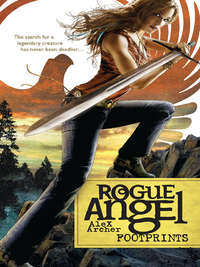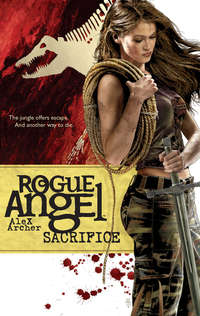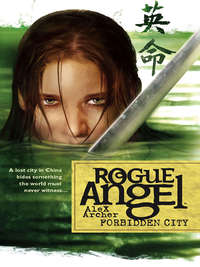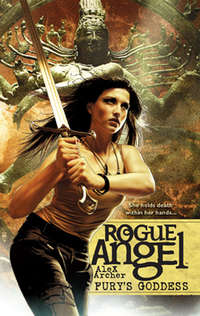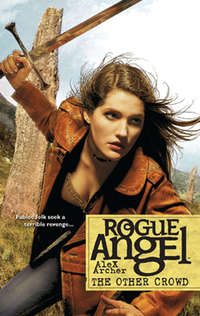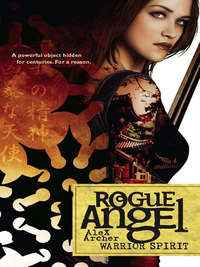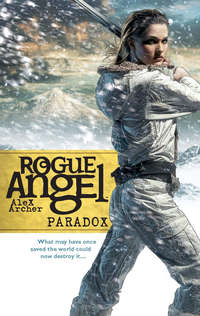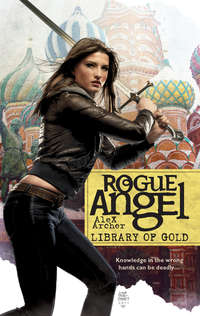
Полная версия
The Lost Scrolls
At least playing spy got Jadzia too excited either for panic or to take potshots at Annja. Annja opened her mouth to question her further, unsure as to whether to trust the young woman’s judgment. Clearly she had a taste for melodrama. Would she see danger where it wasn’t?
Annja shut her mouth. Belatedly it hit her that a degreed cryptologist might actually have a certain bent for spying.
“Right,” she said. “We’ll go out the back.”
So I was wrong, she thought, frowning at the back of her own windbreaker as Jadzia pushed through swinging utility doors. I guess they did make me. I still have a lot to learn about this whole intrigue thing.
Little wiry Egyptian men and women looked at the brisk Western women as they passed through the hotel’s service areas. Jadzia swung along like the health department inspector. Annja followed down the corridor, which smelled of steam and fresh laundry and cooking food, smiling in what she hoped was a friendly rather than nervous manner.
No one challenged them until a door flew open just in front of Annja. A man in a sort of iridescent brown suit tumbled out right in front of her wearing sunglasses and—
“A fez?” Annja said aloud.
The man’s hand dived into his suit coat, which looked as if it had been intentionally made to look slightly greasy. That was all Annja needed. She acted instinctively and grabbed the upper biceps of what she figured had to be his gun arm to control it. She used the leverage to drive a forward elbow-smash into his face with her right arm. She felt impact that jarred clear down to her tailbone, and felt a sharp pain in her own arm.
The man gave up doing whatever he was doing to clutch his face. He fell straight on the floor, bleeding, to the accompaniment of thrashing and mewling noises, she thought.
“Damn,” Annja said, inspecting her right elbow. A tooth had gouged her, drawing blood. She was mighty glad of her strong immune system. Human bites are nasty, she thought.
Jadzia faced Annja across the man’s kicking form, eyes big. “It’s Egypt,” she said. “They wear fezzes. Get over it. Watch out!”
Somebody grabbed Annja from behind in a bear hug that pinned her upper arms to her rib cage. He felt big and smelled of sweat and garlic.
“I got her,” he said in thickly accented English.
He hoisted her feet clear off the cracked linoleum. She felt hot breath on the back of her head, snapped it back hard. She felt, as well as heard, the cartilage of his nose shift. He grunted and his grip on her rib cage slackened.
She thrust her arms forcefully out before her, busting the rest of the way loose. As the corrugated soles of her trusty hiking boots touched down she braced, covered her right fist with her left palm and, spinning clockwise, pile-drove an elbow into a big soft belly.
The elbow was working for her. Her attacker doubled over with a great expulsion of hot, foul-smelling air. Annja took a step to her left and side-kicked the big Egyptian. The force propelled him into a dumbwaiter that stood open in the cracked pink stucco wall to his right. The door dropped on him.
She turned around quickly to see if anybody else wanted to play. She and Jadzia had the corridor to themselves. The hotel maintenance staff did not get paid to intervene heroically in these little disputes among the guests.
She turned back.
The first man she had dropped lay on the floor moaning. His face was covered with blood. He had his hand in his jacket again.
Annja did not think he was scratching an itch. Irritably she kicked him on the point of his chin. His head, which still had the fez crammed on top of it, snapped into the wall beside him. The fez fell off. He slumped.
Annja crouched quickly, reached a bit tentatively into the clamminess of the inside of his biliously colored jacket and fished out a Beretta. Straightening, she dried the grips off with two quick swipes across the rump of her jeans. Then she pulled the slide back far enough for a flash of yellow brass to confirm he had a round chambered.
“Insurance,” she said to Jadzia, whose eyes had gotten even bigger. It was true. She knew that it would be a lot easier to explain shooting an assailant to the local authorities than carving him up with a sword.
“What’s wrong with a fez?” Jadzia asked.
Annja blinked and shook her head once, violently, as if trying to shed water. “It was just way too Casablanca ,” she said. “Let’s just get out of here, okay?”
5
“I think it was the Muslim Brotherhood,” Annja said.
“Nonsense,” Jadzia replied. Beyond her, cars swished up and down the boulevard. Across the street tourists sauntered down a broad walkway that ran along the Alexandrian waterfront. “I heard one of the men shout at you in French.”
“That doesn’t mean anything,” Annja said. “Plenty of Muslims speak French.”
It was late morning. They had survived the night, at least, in a small, somewhat seedy hotel. Fortunately Annja had spent enough time knocking around the world from undergrad days onward to appreciate the fact that it was still pretty plush by Third World standards.
Jadzia had recovered from her shock—or perhaps the thrill of playing adventure spy girl—enough to gripe about the surroundings, from the mildewy smells to the stains on the bedspread.
But once she had slurped down her first mug of strong coffee well charged with sugar, and chomped her way through her first flaky pastry at the sidewalk café on the Corniche, Jadzia found something that appealed to her even more than pouting. Arguing.
Her pretty lips were twisted in a sneer as if she’d forgotten Annja had repeatedly saved her life the night before.
“They were assassins sent by the big oil companies,” Jadzia said in a tone that clearly declared Annja was a moron not to recognize the facts. “They sent them to keep the knowledge of Atlantean energy secrets covered up from the world.”
Annja didn’t react for a moment. She was struck by the fact that the lips sneering at her were covered in a carefully applied layer of lipstick. And as far as Annja knew, Jadzia had no personal effects except her wallet, some credit cards, identification and her passport.
Do I have lipstick that shade? she wondered. The truth was she seldom bothered with it, or makeup in general, except for special events. She realized belatedly she had with her a sort of premade kit—the Mr. Right Emergency Kit—provided to her by her female cronies from Chasing History’s Monsters . She had never, so far as she could recall, used it. Or so much as opened it.
I hope there weren’t condoms in it, she thought.
“Wait,” she said. Jadzia’s last statement had finally penetrated her protective shields of puzzlement. “You’re blaming the oil companies?”
Jadzia nodded.
“Isn’t that a conspiracy theory?”
“Aren’t we victims of a conspiracy?” Jadzia said in infuriatingly superior tones. “Or do you really think that those men all just independently decided to attack us last night, and wound up doing so all at the same time by coincidence? That’s just stupid.”
Annja frowned. It made the snottiness immeasurably worse, somehow, when the brat being snotty was right. At least about that angle of conspiracy. Obviously someone had conspired to hit the Polish-Egyptian dig team last night. And they’d done a hell of a job. Had it not been for the fact that she was getting used to coming under attack, they would have made a clean sweep.
Annja’s fork halted halfway to her mouth. She lowered the chunk of fluffy French pastry with frosting just melting off in the Alexandrian morning heat back to her plate. She felt her stomach do a slow roll. So many, she thought desolately.
She saw the faces of the dead. The beatnik-looking Naser, darkly pretty Maria, cheerful Szczepan Pilitowski, who had died giving Annja a chance to save Jadzia, the scrolls and herself. Ismail—Dr. Maghrabi—who had tried to shield them all with his body, and had been ruthlessly gunned down.
Is this what it means to carry the sword? a lonely child’s voice asked from the wilderness of Annja’s mind. She already knew the answer.
She could hear the gruff voice of her sometime mentor, Roux’s, trying to encompass cynicism and compassion at once, saying, “You cannot save the whole world, child.” And she knew that was true, too.
But can’t I even save those within reach of my arm?
“See?” Jadzia crowed, sipping at her coffee. “You have no answers for me.”
Anger spiked in Annja. She held her body as still as if it were encased in concrete, did not allow the anger to travel so far as her eyes. Jadzia’s malice was the petty malice of a spoiled child, she reminded herself. Innocent malice, if there was such a thing.
And surely there was. By no stretch of her vivid imagination could Annja see Jadzia setting about the callous murder of a dozen helpless, harmless men and women. Her petty rudeness belonged in a different universe from such an act.
Oddly, the very act of restraining herself from lashing back at Jadzia made Annja feel better. “I still think it was most likely Muslim fanatics,” she said in an only slightly constricted voice.
“Why would they attack our dig? Why would they care?” Jadzia asked. “We’ve never heard a peep from Islamists. No threats, not anything. And the Muslim Brotherhood has very much to do already.”
Such as waging an increasingly successful campaign to dislodge the fairly secular Egyptian government, Annja thought. She already saw the sand leaking out of her theory anyway. She had knocked around, and been knocked around of late, enough to have uncomfortably firsthand knowledge of Western special-operations gear. The attackers had worn Western-style blackout dress and night-vision goggles, and carried the generic Western counterterrorism weapon, the MP-5. Presumably the Muslim Brotherhood could buy that stuff and learn to use it. Even at Western expense, given the enormous amounts of military aid and training the U.S. gave Egypt. But for a group as determinedly old-fashioned as the Brotherhood, it seemed distinctly out of character.
Annja took a last sip of her mostly cooled coffee and stood up. “I need to move,” she said. “Getting the blood flowing will help me think.”
“THEY CONSPIRED against us,” Jadzia said again. She dangled her long legs over a parapet of rough dressed stone. Several stories below lay a little shelf of rubble at the base of the citadel wall, and then the water of the Eastern Harbor, slogging and frothing.
Annja paced the terrace behind the Polish girl. White gravel crunched beneath her soles, and she could practically feel the afternoon sun beating on the wide brim of her hat with angry fists. She tried not to think of the risks Jadzia was subjecting herself to. While signs in various languages placed at intervals warned against precisely what the girl was doing, enforcement of safety rules did not seem to constitute a priority for whatever agency had charge of the big, blocky, fifteenth-century fortress of Qait-Bey. Nobody had yelled at her to get down. As for Annja, she already understood that the only way to get Jadzia to stop doing what she was doing was to try to physically prevent her. And the last thing they needed was to draw attention to themselves by getting into a fight.
Actually, the very last thing they needed was for them both to get arrested for causing a public disturbance at a national monument. Her estimate of the Alexandrian police was such that she expected it might take them only seconds to sell the young women to whoever it was who wanted them so dead.
“Why do you blame the oil companies?” Annja asked. She hated to feed Jadzia’s probable paranoia. But she was out of other answers, and a brisk walk through winding streets and out to the tip of the peninsula through growing morning heat hadn’t done a damned thing to replenish her stock. Although Jadzia’s constant whining was at least a bit of a distraction, she had to admit.
“They have the most to lose from what we might discover,” the young Polish woman said.
Annja stopped and looked at her. “What did you find in those scrolls, anyway?”
Jadzia shrugged and kicked the heels of her tennis shoes against the yellow sandstone. They were the only part of her ensemble of the night before Annja had let her keep. “You were there for one of the most tantalizing parts.”
“That bit about the crystals? That just sounded like New Age craziness warmed over.”
Jadzia laughed. “Right. Twenty-five hundred years old is very new.”
“But, I mean, that charging-crystals stuff—”
“We found more earlier. It spoke of all those things you found so funny—flying chariots, artificial lights, lances of light. The ancient Greek who wrote those scrolls, who somewhere got a much purer version of the story than Solon passed down to Critias, he did not have the language of technology to describe an artificial power source. He probably didn’t understand it. Some kind of divine gift, like Zeus’s lightnings chained, would be the closest he could come to expressing it.”
“But using gemstones for batteries,” Annja said. “I’m no physicist, but that sounds pretty implausible.”
An Air France Airbus climbed past them from its takeoff roll, momentarily blanking out the conversation in the scream of its engines. “What?” Annja shouted.
“I said, how would that airplane strike an ancient Greek? Implausible, yes? Everything is impossible until someone does it.”
Annja sought an answer to that and could find none that didn’t ring as hollow as a pewter doubloon. Come on , she told herself. Is she really that much smarter than I am? Or am I letting myself get intimidated, just because everyone told me what a supergenius she was?
Annja had been arguably the brightest girl in the orphanage where she was raised. It had gotten her knuckles rapped by the nuns for being a smart aleck, and had seen her shunned sometimes by girls who thought she was too smart for her own good.
But she thought she had gotten over the expectation of being the smartest person in the room by about the middle of her first semester as a college freshman. So even if Jadzia was smarter than her by some great yawning gap, it did not follow she had to think herself stupid.
“How would something like that work?” she asked. “Storing energy that way.”
Jadzia shrugged. “I am no physicist or engineer, either. But perhaps in some way involving the molecular bonds of the crystalline structure itself?”
That brought Annja up short. That did sound plausible. At least close enough, given she was so ignorant of what she’d really need to know to evaluate the possibility that she didn’t even feel bad about it. She had her own abstruse specialties, she reminded herself, and if crystallography wasn’t among them, that was just okay.
“All right,” she said, “I’ll grant the possibility. On a purely hypothetical basis. But so what?”
“The scrolls could prove alternate energy sources were available,” Jadzia said, “without the inefficiencies of wind or solar power, or the risks of nuclear.”
Annja shook her head and laughed. “It’s not as if they contain a set of blueprints for harnessing that power.”
Jadzia’s smile widened until she reminded Annja forcibly of a cat who’d just discovered how to work the catch on the birdcage. “But maybe that’s—” she patted the green-and-purple synthetic bag plumped beside her on the wall “—still in here.”
“SO WHAT DO WE DO NOW?” the young woman asked.
Jadzia sat on a wall again, drumming her heels against it. This time it was a short retaining wall high up on the town’s ancient acropolis, looking out over the strip of city lights running along the darkness of the Mediterranean. Above her left shoulder, illuminated by floodlights at the base, rose the shiny red granite obelisk miscalled Pompey’s Pillar. Annja knew it was actually built by Diocletian on the ruins of the Temple of Serapis in 297 A.D. Off to her right a smallish sort of Sphinx lay pensive on its pedestal.
Annja paced downslope of her this time, without great energy but still driven. Reaction had set in. They had passed the afternoon wandering in and out of shops in a daze. Annja could remember nothing specific of what they had seen.
They had dinner at a couscous restaurant. Even with ample doses of hot sauce it tasted like wood chips to Annja. They had talked some, sporadically, in muted voices. That was how shock-fatigued they had become. Jadzia was too wasted to be either loud or nasty.
She had told Annja some of her story. She proudly claimed descent from Mozart, which struck Annja as implausible. To Annja’s surprise the girl had been born in the United States, eighteen years before, meaning she carried dual citizenship. Her father, a mathematics professor at the University of Krakow, had been a vocal supporter of the Solidarity labor-union movement. When the Soviet-backed Polish regime had cracked down on Solidarity and arrested its leader, Lech Walesa, Jadzia’s father had fled to the U.S. Sobieslaw Arkadczyk moved in with cousins in Chicago and took a job as a plumber.
While there he had met, through friends, a young Polish woman finishing her Ph.D. in economics at the University of Chicago. They had fallen in love and married.
After political reform brought an effective end to the Communist regime, the couple returned to their homeland. With them went their two-year-old daughter, Jadzia. They were soon both teaching at Krakow University. Sobieslaw’s having been exiled for supporting Walesa, who became the nation’s president in 1990, probably hadn’t hurt their opportunities.
Jadzia had shown signs of extraordinary gifts at a young age. Annja got the impression Sobieslaw and Roksana, Jadzia’s mother, were probably looking pretty hard. Parents did that, Annja knew from observing her contemporaries who had produced offspring. She had no direct experience with parents of her own that she could remember.
In Jadzia’s case, genius wasn’t all in her parents’ eyes, it seemed. Tests demonstrated that she had an astonishing facility for languages, as well as a talent for mathematics.
She was, perhaps inevitably, relentlessly indulged from a very early age.
Jadzia learned to read at the advanced age of three. She did so voraciously. As Annja had, she quickly fell in love with the intrigue and adventure and romance of history. That led to a near obsession with ancient languages.
Oddly, she chose not to study specific languages at school. “Why?” Annja asked.
“I learn them perfectly well by myself,” she replied matter-of-factly.
Instead she studied linguistics and cryptology, the better to decipher unknown languages and tantalizing fragments.
As the sun set and Jadzia finished her story, they had drifted up the hill. Wandering the tourist attractions had kept them masked by crowds during the day. They had already checked out of the hotel where they had spent half of last night, and locked their baggage, except for the scrolls, in lockers at the train station. Tonight they would check into a new hotel as late as possible. Hostelries had to report all foreign guests to the police. The later the pair showed their passports, though, the more likely the hotel staff was to wait until morning to pass the information along to the police. And the less likely the police were to actually notice them at all. Just because their pursuers could readily bribe the Alexandrian police didn’t mean they could make them efficient.
And now at last Jadzia had asked the question, literally, of life and death: What do we do now?
“We have to find a way to get whoever is hunting us off our backs,” Annja answered.
“How can we do that?”
“We could give them what they want.”
“Sure,” Jadzia sneered. “And then they kill us anyway.”
She had gotten so lethargic Annja was almost relieved to see her get snotty again. Almost.
“That’s true,” she said.
“What? You aren’t going to accuse me of conspiracy theories?”
Annja laughed without a lot of humor. “As you pointed out, somebody really is conspiring against us. But what if we were to negate the value of what you’re carrying?”
The girl’s eyes turned to blue slits of suspicion. “What do you mean?”
“Release the information the scrolls contain,” Annja said. “If whoever’s after us is willing to kill to keep the information secret, and I confess I can’t think of any other reason they attacked you, then it stands to reason that if we make the information public, they’ll have no more incentive to kill us. Doesn’t it?”
“What if they still want to kill us for revenge?”
Annja shrugged. “It’s possible. But murder is an expensive proposition, even for the rich and well-connected. Continuing a vendetta against a couple of young women—who have incidentally become world-famous figures—might not make a whole lot of sense when vast profit or power no longer lie at stake. Whoever ordered the hit on your dig team, whether it was a corporate executive or government minister, probably has powerful rivals who aren’t any more scrupulous than he is. Wasting resources closing the barn door after the horse has escaped might be all the pretext such rivals might need to make a move against him.”
She held her breath then, uncertain of whether the girl was going to go off on her or not. She was like nitroglycerin.
But Jadzia smiled, then laughed. “Twisted,” she said. “I like the way you think.”
And what would worldwide notoriety do for my career? Annja wondered. As an archaeologist, as a consultant for Chasing History’s Monsters , as champion of good?
She shrugged. A lot less harm than getting abruptly dead in the next few days, she conceded to herself.
“But what about revenge? ” Jadzia asked.
Annja did not particularly care for the gleam she saw in the young Polish linguist’s eyes. In part that was because she wasn’t so sure it wasn’t shining from her own.
She found herself smiling. “Can you think of anything better,” she asked, “than revealing the secret they want so very badly to keep?”
6
“We’re still waiting,” the fresh-faced Mormon guy said. Although his hair didn’t seem to be receding he managed to show a lot of forehead in the late-morning sunlight. His forehead bulged, somehow.
“For what?” Jadzia asked.
Seagulls wheeled over the Bay of Naples in the bright blue morning sky, complaining of fate. The Mediterranean wind stirred the scrubby pines dotted across the hillside and rattled dust and small porous pebbles against larger rocks and randomly rearranged them in clumps at the bases of the wiry plants. The square smelled of dust and ancient dressed stone and not-so-ancient hot asphalt from the parking lot. Annja felt the weight of time and mortality as she and Jadzia walked with their attentive guides through the ruins of Herculaneum.
Which was a familiar and pleasant feeling for the archaeologist.
The two women were being escorted through a ghost town of pallid stone by several researchers from Brigham Young University and a few employees of the small Herculaneum museum, which, like the site as a whole, was closed to the public at the moment. Annja and Jadzia were getting a personal tour as a professional courtesy.
The researchers seemed excited to meet Annja, a genuine television celebrity, and one from their field—one moreover who might somehow be able to bring the manna of airtime or even coveted television-network dollars to their project. But Jadzia they actually seemed to regard with awe. It was as if a rising baseball superstar were visiting another team’s locker room.
“For the permission by the Italian government,” said Pellegrino. In his early thirties, he was the oldest of the museum crew. He was short and wiry, if a bit bandy-legged. He wore a horizontally striped red-and-blue jersey over shorts. “Further excavation has been held up until the ministry decides whether to give priority to a conservation strategy first.”
“Or until the Americans come up with a bigger bribe,” said Tancredo, a tall young man with a shock of straw blond hair, blue eyes and a Lombard accent.


